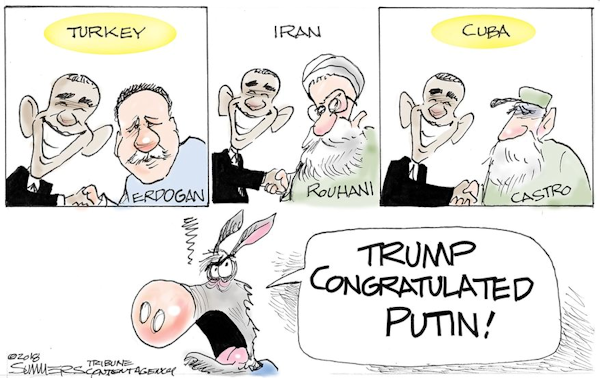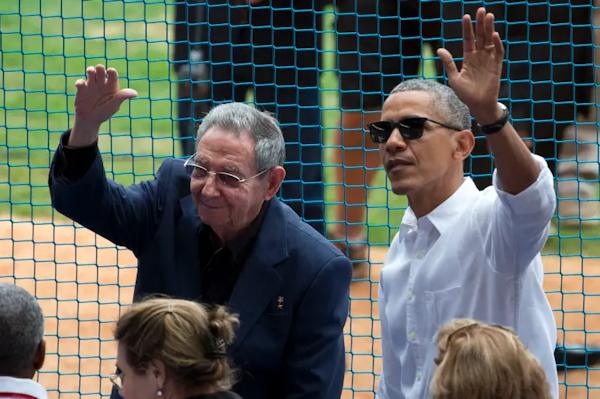Trump’s Rhetoric: Closer to Mussolini Than Hitler.
Donald Trump’s public speaking style is characterized by populism, grievance-driven rhetoric, bombast, insults, and personal branding.
His speeches and public statements rely heavily on exaggeration, mockery, and an “us vs. them” narrative.
While there are some similarities to both Adolf Hitler and Benito Mussolini, Trump’s approach far more closely resembles Mussolini in terms of delivery, improvisation, and self-promotion, rather than Hitler’s rigid ideological fervor.
Read the full article
More like Hitler or Mussolini? Here’s why years ago I labeled Donald Trump as “The American Il Duce.”
Posted in Adolf Hitler, Benito Mussolini, Donald Trump - Adolf Hitler Comparisons, Donald Trump - Benito Mussolini Comparisons
Comments Off on More like Hitler or Mussolini? Here’s why years ago I labeled Donald Trump as “The American Il Duce.”
The Court-Martial of Captain John Sheridan
By the time of President Morgan Clark’s death by suicide, Earth had endured a descent into dictatorship, martial law, and outright tyranny. The evidence of Clark’s crimes was overwhelming and widely known—his corruption had been exposed, his methods had been brutal, and his war against his own people had been catastrophic. Attempting to court-martial Babylon 5 Captain John Sheridan—the leader of the resistance against Clark’s regime—would have been politically untenable and likely impossible from both a legal and practical standpoint.
To fully understand why, we need to examine:
Read the full article:
To fully understand why, we need to examine:
Read the full article:
Posted in Babylon 5
Comments Off on The Court-Martial of Captain John Sheridan
What should be the proper role of military officers if Il Duce orders a military attack on Greenland or Canada . . .
… in violation of our Constitution (only Congress can declare war) and our legal treaties with those NATO partners?
• Obedience?
• Refusal?
• Resistance?
Join the conversation:
https://similarworlds.com/politics/5223082-What-should-be-the-proper-role-of-military-officers-if-Il
• Obedience?
• Refusal?
• Resistance?
Join the conversation:
https://similarworlds.com/politics/5223082-What-should-be-the-proper-role-of-military-officers-if-Il
Posted in Canada, Donald Trump - Second Term, Greenland, U.S. Expansion, U.S. Foreign Policy - Canada
Comments Off on What should be the proper role of military officers if Il Duce orders a military attack on Greenland or Canada . . .
Executive Order 9981
Some might argue the President’s decision was simply one of political expediency.
But the truth is buried deep in the still classified files from World War II.
The White House
October 1946
“President Truman, may I present General Robert Hogan…” Read more… https://www.fanfiction.net/s/13419002/1/Executive-Order-9981
Join the conversation:
https://similarworlds.com/politics/5222833-Executive-Order-9981-Some-might-argue-the-Presidents
But the truth is buried deep in the still classified files from World War II.
The White House
October 1946
“President Truman, may I present General Robert Hogan…” Read more… https://www.fanfiction.net/s/13419002/1/Executive-Order-9981
Join the conversation:
https://similarworlds.com/politics/5222833-Executive-Order-9981-Some-might-argue-the-Presidents
Posted in Alternate History, Executive Order 9981, Harry Truman, World War II
Comments Off on Executive Order 9981
If the U.S. “buys” Gaza from Israel, won’t that make 2 million Palestinians into American nationals?
What will Trump’s MAGA base think of that?
Join the conversation:
https://similarworlds.com/politics/5222910-If-the-U-S-buys-Gaza-from-Israel-wont-that-make-2-million
Join the conversation:
https://similarworlds.com/politics/5222910-If-the-U-S-buys-Gaza-from-Israel-wont-that-make-2-million
Posted in Donald Trump - Second Term, Gaza, U.S. Expansion
Comments Off on If the U.S. “buys” Gaza from Israel, won’t that make 2 million Palestinians into American nationals?
As George W. Bush once said, “It’s not the government’s money. It’s the people’s money!”
But the Trump/Vance duo thinks otherwise.
Il Duce is considering taxing remittances of legally earned and already taxed income of American citizens and legal residents who wish to give a legal gift of tender to relatives living outside of the United States.
JD Vance had a bill in the previous session of Congress to do just that!
Join the conversation:
https://similarworlds.com/politics/5220646-As-George-W-Bush-once-said-Its-not-the-governments-money-Its
Il Duce is considering taxing remittances of legally earned and already taxed income of American citizens and legal residents who wish to give a legal gift of tender to relatives living outside of the United States.
JD Vance had a bill in the previous session of Congress to do just that!
Join the conversation:
https://similarworlds.com/politics/5220646-As-George-W-Bush-once-said-Its-not-the-governments-money-Its
Posted in Donald Trump - Second Term, George W. Bush, J.D. Vance, Taxes
Comments Off on As George W. Bush once said, “It’s not the government’s money. It’s the people’s money!”
The World War II Battle in the Pacific That Saved Russia’s Ass
Today is the 81st anniversary of the Battle of Midway – the battle that saved Russia’s ass.
If the Japanese deal a crushing blow to the U.S. Navy at Midway, the Russians are screwed.
What happens when the Indian Ocean becomes a Japanese lake? Where were the supply lines to Russia?
The Brits withdrawl from the Indian Ocean completely. Not even their naval bases in east Africa would be safe. Bases in India were already at risk. The Indian Ocean raid by the Chuichi Nagumo’s First Air Fleet in early 1942 proved that. With ever-increasing Japanese naval activity in the area, Admiral Somerville’s secret base at Addu Atoll in the Maldive Islands would have surely been discovered (or abandoned). The chances significantly increase that India falls to the Japanese (enough of it, that is, to matter).
The U.S. redirects what’s left our navy to protect Hawai’i and the west coast. Supplies to the Soviets would only be able to go thru the Murmansk route. When the days get shorter, the u-Boat menance intensifies with the Germans knowing that if they concentrate on disrupting the Atlantic convoys supplies to the U.S.S.R. will drop dramatically.
With Midway in Japanese hands, there’s the possibility of the Japanese blockading Hawai’i. Our old battlewagons from World War I wouldn’t be able to convoy supplies without air cover. And their slow speed made them extremely vulnerable to torpedo attack.
The attack on Pearl Harbor had already devasted the 7th Air Force. And with the loss of the aircraft carriers Yorktown (which actually was sunk during the battle) added to the losses of Enterprise and Hornet in a defeat at Midway, the Saratoga would have been the lone U.S. carrier in the Pacific. Lexington had been previously sunk during the Battle of the Coral Sea. There’s also the additional loss of an unknown number of heavy cruisers and a devasting loss of lives, especially to U.S. Navy pilots.
The Ranger would likely be transfered to the west coast, but wasn’t really capable of doing much more than anti-submarine patrols (which it was doing in the Atlantic). The Wasp would be moved from the Mediterrean to the Pacific (just as it was in the real time line). But even with accelerated builder’s trials, the newest U.S. carrier, Essex, wouldn’t be in the Pacific until May 1943. The next carrier, Yorktown (CV-10), doesn’t enter the Pacific until July 1943. It would be into late 1944 before the U.S.N. would have enough carriers to even think of entertaining any kind of offensive operations.
And the loss of an important submarine base (Midway) greatly harms the ability of the U.S. submarine fleet to attack Japanese shipping in the Greater East Asia Co-Prosperity Sphere. As a result, more oil throughout the war makes it to Japan from the Dutch East Indies, as USN subs must travel over 1,200 miles further, now from Hawai’i’, with reduced time on patrol once they get to their hunting grounds. And with a lot more oil available to use, the IJN is much more dangerous.
In fact, Midway then becomes an important Japanese submarine base, with the IJN attacking U.S. shipping all along the West Coast. To combat this, more destroyers are moved from the Atlantic to the Pacific. Up north, retaking Attu and Kiska any time soon is out of the question.
With what’s left of the U.S. Navy guarding the U.S. west coast, it’s also possible that Chuichi Nagumo’s First Air Fleet is used to bomb the Panama Canal, destroying the locks and forcing any U.S. naval transfers from the Atlantic to come around past Cape Horn. Rear Admiral Tamon Yamaguchi had advocated this before he died with the sinking of the carrier Hiryū at the Battle of Midway.
With Hawai’i put into greater danger, not to mention the U.S. west coast, from carrier raids, combined with the Japanese ability to send more ship to the area, Guadalcanal falls and Samoa as well, thus increasing the threat to Australia. The Australian government is under real pressure to recall its remaining troops from Egypt. Bringing the 7th Division home could result in the British losing to the Afrika Corps at El Alamein. If that happens, the Suez Canal would fall into German hands.
Oh, and if the Ruskies aren’t already fucked because of all that above, they can’t send afford to shift troops from Siberia to Moscow. They had only done so in 1942 after Midway, realizing that Japan was no longer a threat to stab them in the back despite their non-aggression pact. They found out in June 1941 just how meaningless such pacts were and kept substantial troops in the east to guard against a surprise Japanese attack. The Russians probably manage to hang on to Moscow, but probably at the expense of losing Leningrad.
And without enough supplies from Britain and the U.S., having to still guard against the Japanese in the east and facing reinforced German troops after Field Marshal Erwin Rommel is victorious in Egypt, Stalingrad falls.
Although Britain and the U.S. will try to convince Stalin to remain in the war, there would now be a strong possibility that he capitulates to the Nazis if only to save his only neck.
As for the west, Britain can still hold out (thanks to the Royal Navy) and U.S. shipbuilding will help get the U.S. Navy back in a position of strength vis-a-vis the Japanese. But General Douglas MacArthur “island-hoping” campaign is delayed by at least one, perhaps two years.
We still win the war, though. An atomic bomb dropped on Nuremberg in August 1945 sees to that. It’s probably going to take longer to hit Japan, though. We likely wouldn’t yet be in control of Tinian island, Saipan or any other island close enough to Japan for our B-29s to operate with effectiveness. For that matter, all the conventional bombings of Japanese cities during the war, especially Tokyo? Much of that devastation doesn’t happen either (or is delayed significantly) for the same reason. Japan has much more stronger military, in the air at sea and on the ground, going into 1945.
There’s no Soviet counter-invasion into the eastern European occupied countries (nor the ones aligned with Nazi Germany).
But the extra cost in human lives, particularly in German and Japanese occupied territories, is horrendous.
If the Japanese deal a crushing blow to the U.S. Navy at Midway, the Russians are screwed.
What happens when the Indian Ocean becomes a Japanese lake? Where were the supply lines to Russia?
The Brits withdrawl from the Indian Ocean completely. Not even their naval bases in east Africa would be safe. Bases in India were already at risk. The Indian Ocean raid by the Chuichi Nagumo’s First Air Fleet in early 1942 proved that. With ever-increasing Japanese naval activity in the area, Admiral Somerville’s secret base at Addu Atoll in the Maldive Islands would have surely been discovered (or abandoned). The chances significantly increase that India falls to the Japanese (enough of it, that is, to matter).
The U.S. redirects what’s left our navy to protect Hawai’i and the west coast. Supplies to the Soviets would only be able to go thru the Murmansk route. When the days get shorter, the u-Boat menance intensifies with the Germans knowing that if they concentrate on disrupting the Atlantic convoys supplies to the U.S.S.R. will drop dramatically.
With Midway in Japanese hands, there’s the possibility of the Japanese blockading Hawai’i. Our old battlewagons from World War I wouldn’t be able to convoy supplies without air cover. And their slow speed made them extremely vulnerable to torpedo attack.
The attack on Pearl Harbor had already devasted the 7th Air Force. And with the loss of the aircraft carriers Yorktown (which actually was sunk during the battle) added to the losses of Enterprise and Hornet in a defeat at Midway, the Saratoga would have been the lone U.S. carrier in the Pacific. Lexington had been previously sunk during the Battle of the Coral Sea. There’s also the additional loss of an unknown number of heavy cruisers and a devasting loss of lives, especially to U.S. Navy pilots.
The Ranger would likely be transfered to the west coast, but wasn’t really capable of doing much more than anti-submarine patrols (which it was doing in the Atlantic). The Wasp would be moved from the Mediterrean to the Pacific (just as it was in the real time line). But even with accelerated builder’s trials, the newest U.S. carrier, Essex, wouldn’t be in the Pacific until May 1943. The next carrier, Yorktown (CV-10), doesn’t enter the Pacific until July 1943. It would be into late 1944 before the U.S.N. would have enough carriers to even think of entertaining any kind of offensive operations.
And the loss of an important submarine base (Midway) greatly harms the ability of the U.S. submarine fleet to attack Japanese shipping in the Greater East Asia Co-Prosperity Sphere. As a result, more oil throughout the war makes it to Japan from the Dutch East Indies, as USN subs must travel over 1,200 miles further, now from Hawai’i’, with reduced time on patrol once they get to their hunting grounds. And with a lot more oil available to use, the IJN is much more dangerous.
In fact, Midway then becomes an important Japanese submarine base, with the IJN attacking U.S. shipping all along the West Coast. To combat this, more destroyers are moved from the Atlantic to the Pacific. Up north, retaking Attu and Kiska any time soon is out of the question.
With what’s left of the U.S. Navy guarding the U.S. west coast, it’s also possible that Chuichi Nagumo’s First Air Fleet is used to bomb the Panama Canal, destroying the locks and forcing any U.S. naval transfers from the Atlantic to come around past Cape Horn. Rear Admiral Tamon Yamaguchi had advocated this before he died with the sinking of the carrier Hiryū at the Battle of Midway.
With Hawai’i put into greater danger, not to mention the U.S. west coast, from carrier raids, combined with the Japanese ability to send more ship to the area, Guadalcanal falls and Samoa as well, thus increasing the threat to Australia. The Australian government is under real pressure to recall its remaining troops from Egypt. Bringing the 7th Division home could result in the British losing to the Afrika Corps at El Alamein. If that happens, the Suez Canal would fall into German hands.
Oh, and if the Ruskies aren’t already fucked because of all that above, they can’t send afford to shift troops from Siberia to Moscow. They had only done so in 1942 after Midway, realizing that Japan was no longer a threat to stab them in the back despite their non-aggression pact. They found out in June 1941 just how meaningless such pacts were and kept substantial troops in the east to guard against a surprise Japanese attack. The Russians probably manage to hang on to Moscow, but probably at the expense of losing Leningrad.
And without enough supplies from Britain and the U.S., having to still guard against the Japanese in the east and facing reinforced German troops after Field Marshal Erwin Rommel is victorious in Egypt, Stalingrad falls.
Although Britain and the U.S. will try to convince Stalin to remain in the war, there would now be a strong possibility that he capitulates to the Nazis if only to save his only neck.
As for the west, Britain can still hold out (thanks to the Royal Navy) and U.S. shipbuilding will help get the U.S. Navy back in a position of strength vis-a-vis the Japanese. But General Douglas MacArthur “island-hoping” campaign is delayed by at least one, perhaps two years.
We still win the war, though. An atomic bomb dropped on Nuremberg in August 1945 sees to that. It’s probably going to take longer to hit Japan, though. We likely wouldn’t yet be in control of Tinian island, Saipan or any other island close enough to Japan for our B-29s to operate with effectiveness. For that matter, all the conventional bombings of Japanese cities during the war, especially Tokyo? Much of that devastation doesn’t happen either (or is delayed significantly) for the same reason. Japan has much more stronger military, in the air at sea and on the ground, going into 1945.
There’s no Soviet counter-invasion into the eastern European occupied countries (nor the ones aligned with Nazi Germany).
But the extra cost in human lives, particularly in German and Japanese occupied territories, is horrendous.
Posted in Alternate History, U.S. Navy, World War II
Comments Off on The World War II Battle in the Pacific That Saved Russia’s Ass
Donald Trump Praises Hillary Clinton.
“I think she’s fantastic.”
– Donald Trump, on Hillary Clinton.
Join the conversation:
https://similarworlds.com/politics/1937831-Trump-Praises-Hillary-Clinton-Thoughts
Posted in Donald Trump - Strange But True, Hillary Clinton
Comments Off on Donald Trump Praises Hillary Clinton.
Where Does He Find the Time?
Trump Tweeted Ten Times Yesterday
Join the conversation:
https://similarworlds.com/politics/1937659-Where-Does-He-Find-the-Time-Trump-Tweeted-Ten
Posted in Tweets by Donald Trump
Comments Off on Where Does He Find the Time?



